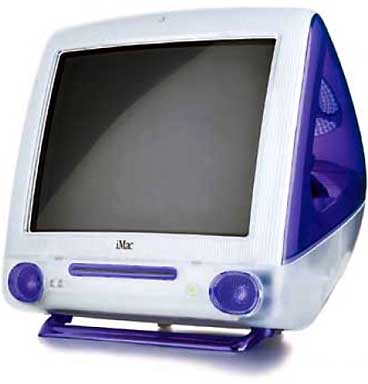2000: In a previous article, I mentioned that Jesse Berst was jumping the gun by saying that Apple was offering nothing new. A particularly astute reader pointed out that, in fact, Apple has indeed stopped innovating. This reader was obviously a Mac lover and was in no way bashing me or Apple.
So, has Apple stopped innovating?

Let’s define “innovation” as it will be used in the context of this article before we begin. Innovation, according to Dictionary.com, is “a new device or process created by study and experimentation.” Let’s go with that.
Has Apple released a new device or process in the last year or two? Bear in mind that the “new device” does not include repackaging something in a new skin.
 The iMac might be considered a “new” device by many. Its funky shape and unique cooling system definitely make it “new” in many ways. However, is this really new – or just a refining an already existing machine (the personal computer)?
The iMac might be considered a “new” device by many. Its funky shape and unique cooling system definitely make it “new” in many ways. However, is this really new – or just a refining an already existing machine (the personal computer)?
A lot of hard work and research went into this design to make it work properly. So, while others may see it as an innovation, I consider this a refinement. It’s not an easy call, and I can see and understand arguments to the contrary. This is what I call a 51 to 49 split. 51% of me says it’s a refinement and 49% of me says it’s an innovation.
 The Cube is no easier. Packing that much power into such a small space is no mean feat of engineering. Again, however, the argument can easily be made that Apple is simply refining an existing technology, not innovating. Great cooling system, compact design, and plenty of power make this a pretty great machine. Unfortunately, this also falls into the refinement category. It’s a box with computer components inside it.
The Cube is no easier. Packing that much power into such a small space is no mean feat of engineering. Again, however, the argument can easily be made that Apple is simply refining an existing technology, not innovating. Great cooling system, compact design, and plenty of power make this a pretty great machine. Unfortunately, this also falls into the refinement category. It’s a box with computer components inside it.
The Commodore 64 is a box with computer components in it.
On the software side, things get a little muddier. We are all eagerly anticipating Mac OS X and all the great things that it will bring. Is Apple’s new OS truly innovative, though? Unix has been around for a while, and the Mac GUI has been around for a while. Isn’t this just a more refined version of both operating systems?
The way we interact with computers has remained essentially unchanged for 15 years. We enter commands or click on icons. How do we interact with OS X? We enter commands or click on icons. The system will definitely be stable and quick, but the way we interact with it introduces nothing truly new.
Underneath, there is definitely some great technology at work. But is it new? Or is it a refinement on an older concept? Is Apple charting the course or sticking close to the shore? While I have written (with much assistance from subject-matter experts) programming courses, I am not a programmer and I will not comment on any potential Apple innovations in the backend OS X arena. You can read various articles concerning OS X at Stepwise, Ars Technica, and even Slashdot and draw your own conclusions.
From a GUI perspective, Apple is not innovating. It is not introducing new ways for users to interact with their machines. The original point and click interface from 1984 was clearly an innovation. OS X is a refinement of this concept.
And this is the crux of the problem. What’s next? It’s the big question that just won’t go away. We’ve gone from Model T’s to Formula 1 racers, but the next big step is still unclear. This is a space that Apple occupied in 1984 with the introduction of the point-and-click interface.
How will we move beyond this interface? Does Apple have the answer? Is it working on the answer?
I don’t know, and I don’t think many people do know. As I’ve said before, I think that they must be up to something. The crew at Apple is too smart to be sitting on their hands. There are signs that indicate otherwise as Stepwise indicates (no longer online).
Of course, I don’t expect this next generation interface to make it’s appearance immediately. The internal combustion engine has been used for a century, and alternatives are just now starting to make their appearance on the mass market.
How you react to Apple’s approach to innovation is largely dependent on what you expect from Apple. Steve Jobs has stated that he wants Apple to be like Sony.
This is not necessarily a bad thing. Sony makes great consumer products that are stylish, useful and profitable. David K. Every, who runs MacKido, wrote an excellent article that makes the case that Apple is a better, if less innovative, company now than it was before.
However, if you want Apple to be turning out things that redefine the computer landscape, like the Mac GUI and Newton, it might be better to look elsewhere. Apple does introduce great products that are functional, useful, and just plain great to look at. It does not, however, innovate as much as it used to.
Long-term R and D expenditures are way down, which indicates that Apple is placing much more emphasis on the “here and now” problems rather than the “then and later” problems. This is not surprising, considering that both Apple and Steve Jobs have been burned more than once for being ahead of their time. PDAs are all the rage now, even though the Newton (1993-97) was the first on the scene. We are only now seeing some of the benefits of NeXT.
Whether or not being out in front matters depends on what you want out of Apple: solid (if safe) performance and financial gains, or glory and first-mover status.
In the long run, I’ll take solid performance any day.

